|
CEB reports remarkable turnaround:
Broadland power project sees the light of day
By Shirajiv SIRIMANE
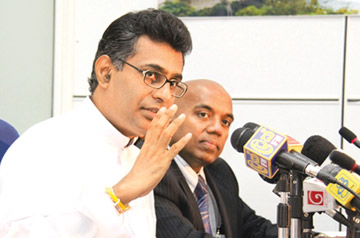 |
|
Minister of Power and Energy Patali
Champika Ranawaka and CEB Chairman, Vidya Amarapala at the
Press Conference |
The ground-breaking ceremony for the hydro power plant Broadland was
held recently with a touch of difference.
Though usually Seth Pirith is chanted to invoke blessings at a
ground-breaking ceremony of this nature, the Ceylon Electricity Board
(CEB) this time around decided to have a Bahirawa Pooja in a bid to "get
assistance from the gods and devils". There was a very good reason for
this.
The Broadland power project was to have commenced 20 years ago.
The plans had already been submitted. However, the project never got
off the ground with various excuses such as the lack of funds,
environment constraints being put forward.
There was also speculation that companies providing diesel-generated
power to the CEB were behind this delay as their business would be at
stake with more hydro-power generated projects being implemented.
The CEB buys a unit generated via hydro power for around two rupees
while around Rs12 is paid for a unit generated from thermal power.
However a decision was finally taken recently, tenders were called
for and the contract was to be awarded to a Chinese company which
tendered the lowest bid.
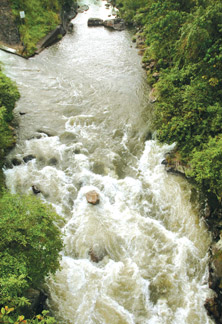 |
|
The site where the Broadland Dam would
be built |
The cost of the project was USD 82 million. It was due to these
controversies that the CEB needed not only the support of the gods, but
also the blessings of the devils before the project got under way even
in times the Minister is planning to introduce nuclear energy to Sri
Lanka.
However, there was pressure that the project be handed over to a
bidder who was quoting around USD 120 million.
The pressure was so intense that some of the high-ranking officials
of the CEB had to flee the country as they faced death threats.
Finally the matter was ironed out with China National Electric
Equipment Corporation being awarded the tender with the pledge that the
project be completed by 2014.
Professor Mudiyanse Dissanayake of the Colombo University, who was in
charge of the pooja, said that these prehistoric traditions have being
performed even before the Buddha was born. "When a new building is
constructed, these rituals are carried out even now.
If there is no benefit in them, will these traditions still be
practised?" he asked.
Broadlands Hydro Power Project will be constructed over the Kelani
River, near Kitulgala, with a tunnel taking the water nearly six
kilometres to the power house.
The CEB says that the project can prevent carbon emissions by 86,000
metric tons per year. The State can earn USD 2.4 million per year
through carbon trading.
The project will have an installed capacity of 35 MW and expects to
generate 126 GWh of electrical energy annually.
Minister of Power and Energy Champika Ranawaka said that hydro power
was one of the keys to turn the CEB around from a loss-making
institution.
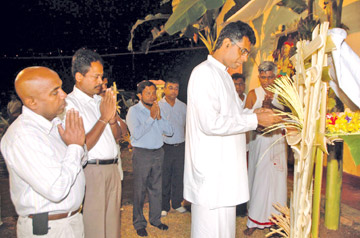 |
|
Minister of Power and Energy Patali
Champika Ranawaka and CEB Chairman, Vidya Amarapala at the
pooja |
He said that people may be surprised to learn that a family using
kerosene lamps spends more than a family using electricity.
"This is one reason for us to fast-track our project to provide
electricity for all by 2012," the Minister said.
Profit after 10 years
The CEB, which had been written off as a loss-making institution,
becoming a major financial burden on Government coffers, has made a
dramatic U-turn and reported profits.
The institution, which was expected to end the last financial year
(2010) with a Rs. 40 billion loss, has turned around and has posted a
Rs. 5 billion profit.
The key to this turnaround as mentioned by Minister Ranawaka at a
recent media briefing is short-term plans to resurrect the institution,
which has yielded positive results. "This is no fluke or a surprise to
us. This is a result of coordinated efforts by employees of the CEB. The
regular rainfall during the last financial year also helped the CEB to
turn around", the Minister said.
It is after 10 years that the CEB has reported profits. It was
possible to avoid taxing the people the additional Rs. 2,000
irrespective of social status. Thus it is considered a victory for the
people more than an achievement for the CEB, he said.
He said that profit has been recorded after the CEB settled all its
dues regarding purchases it had made in the 2010 financial year. Hence,
for the first time in history, during 2010, the CEB has settled all dues
payable to the Petroleum Corporation within the year.
No payments due
Several media organisations were of the opinion that the Petroleum
Corporation was incurring losses due to the payments due by the CEB.
They said that due to the CEB purchasing heavy fuel at Rs. 40 per litre
from the Petroleum Corporation, where the actual cost is Rs. 81. a 50
percent loss was incurred by the Petroleum Corporation.
|
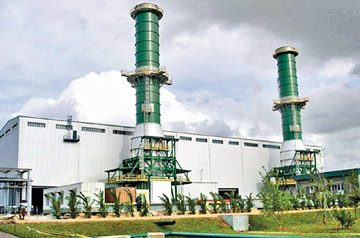 |
|
The Kerawalapitiya
project |
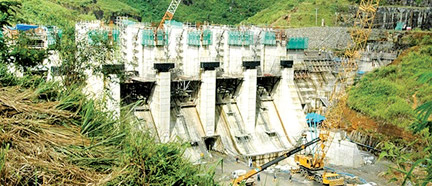 |
|
Upper Kotmale project
|
The CEB had, up to August 31, 2010, purchased heavy fuel from the
Petroleum Corporation for a mere Rs. 26. Upon the request of the
Petroleum Corporation, discussions were held and the amount was
increased to Rs. 40 per litre. This decision was reached with the
intervention of the Ministry of Finance. Furthermore, diesel will be
purchased according to the normal market rate; NAPTA purchases it for
Rs. 42.
In the production process of petroleum, heavy fuel is a residual
product after the purification process of diesel and petrol. It is 38
percent of the entire process. The remnant heavy fuel percentage is far
greater than all petroleum products.
As a solution to this the CEB has set up thermal power stations such
as Sapugaskanda.
A major factor was that the Petroleum Corporation agreed to supply
the heavy fuel which it had no use for, free to the CEB.
Therefore, it is obvious that the Petroleum Corporation is not
incurring losses due to the supply of free heavy fuel, but rather due to
long-standing problems in the purification process, Minister Ranawaka
said.
Before December 31, 2009, the dues owed to the Petroleum Corporation
by the CEB which was Rs. 52 billion was covered by Treasury without
burdening either the CEB or the Petroleum Corporation, he said. "In
addition to the profit, CEB is being converted to a people-friendly
institution. Unlike in the past today one could call the CEB and talk
directly with an official or make a complaint and expect an officer to
call back."
The CEB has also taken a bold initiative to electrify the entire
country including the North and the East by the end of next year.
Apart from preventing electricity tariff hikes, the Board is also
looking at alternative energy sources which include nuclear power.
|

